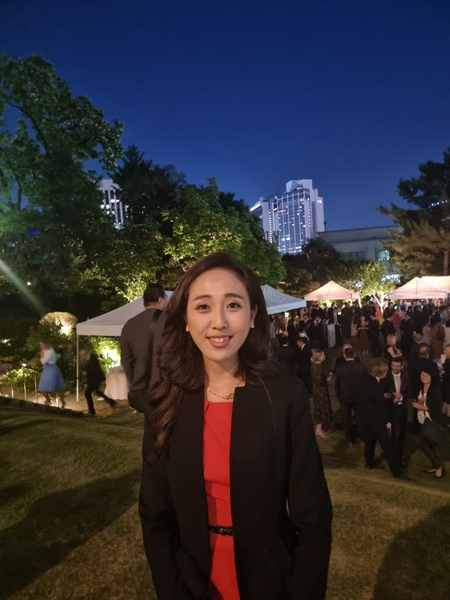
“Humanity and integrity are all you have.”
As a senior Hanyang Journal (HJ) reporter, a Hanyang University (HYU) graduate, and a life mentor, journalist Oh Soo-young stresses humanity, impartiality, and transparency as the core values of journalism. Working as a presidential correspondent at Arirang TV, she has anchored the current affairs program of Arirang TV. The HJ was able to interview Oh Soo-young and listen to what she has yearned for, learning how professional, engaged, and motivated she is while working as a journalist.
# Introducing Oh Soo-young
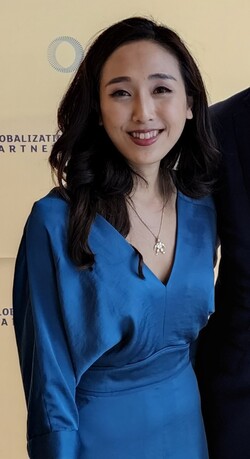
Q. Hello, please introduce yourself.
A. Hi, I am Oh Soo-young, a former reporter and Editor-in-Chief of the HJ, and now working as a presidential correspondent at Arirang TV. I am a graduate of the School of International Studies of HYU. I love listening to people’s stories and am inspired by them, which is fortunate given that I am a journalist. I am addicted to coffee and spend more of my time and salary than I should on cappuccinos.
Q. Please tell us what you are currently doing for work.
A. I was a main anchor at Arirang TV three months ago, and I am currently the presidential correspondent for Arirang News, South Korea’s only English-language TV newsroom. An anchor shares a lot in common with a reporter; they both engage in organizing and conveying news-focused content. I cover a range of major political developments in South Korea and its foreign policy, social, and economic initiatives based on the president’s activities and policies. Most recently, I was in Washington, D.C., and Boston, accompanying the president’s official state visit to the U.S. So, I compiled daily reports and tried to convey the significance of those events to our viewers through my stories and interviews. Right now, I am preparing for the upcoming bilateral summit of South Korea and Japan.
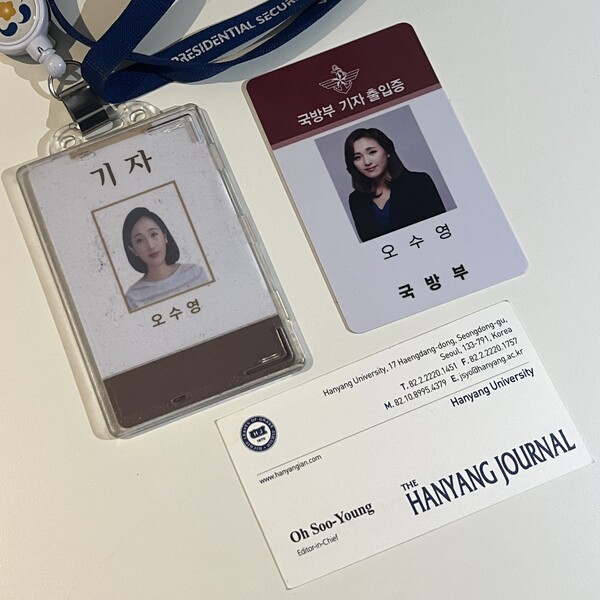
# As a journalist Oh Soo-young at Arirang TV
Q. What led you to work in the field of international broadcasting?
A. I never imagined myself working in broadcast journalism or in a global newsroom. I had no idea what I should do after graduation. But like many things in life, it naturally developed, out of boredom and desperation for a job. Working as a reporter since 2015, I had numerous chances to be in charge of exclusive interviews. The head of the news center offered me the chance to lead a news interview corner, and an unexpected chain of events led me to the Arirang newsroom. I am incredibly blessed that I ended up in the right place.
Q. How did your experience in the HJ influence you to become a journalist?
A. My experience in the HJ was a series of tensions, yet it eventually became a great cornerstone. I loved writing, but the strenuous training, the sheer amount of work, and the pressure of finding the right items and interviewees made me anxious to work in journalism. I got job experiences at NGOs, and corporate PR, but never in journalism – I wanted nothing to do with it. However, in retrospect, I think I was destined to become a reporter because it defines me. My very first piece for the HJ was an interview with an immigrant worker living in the outskirts of Seoul with low pay, dim prospects, and even discrimination in the workplace and his family. Chasing humane voices, traces of hope amid despair, and confronting unique stories drive me to work as a journalist. Living day by day and story by story has become the pattern of my life. Right now, I would not have it any other way.
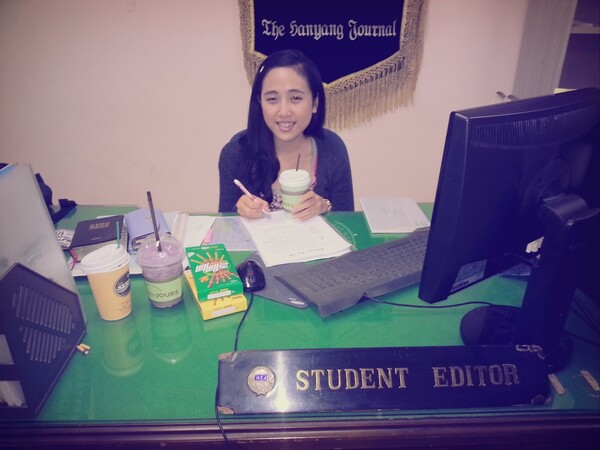
Q. What were the biggest challenges in covering news cases? How did you, or do you overcome it?
A. I was always praying for a miracle. In this field, most situations occur unexpectedly, or at least inopportunely. It was daunting from the beginning and every day was an uphill battle. Being assigned random stories, finding the right people to interview, getting them on camera, and making sense of all the developments in less than half a day – makes you admit that you cannot plan or control everything. Instead, you rely on hope, try your best, and look to providence. Despite the horrendous hours, I was also greeted by lots of warm support and insightful guidance from relationships which uplifted and kept me moving forward even in the most difficult times. Whenever the interviewees cancelled at the last minute or I felt unwell and incompetent, my bosses, colleagues, and seniors at Arirang showed unfazed leadership and entrusted me with anchoring current affairs shows.
Q. What is the most rewarding aspect of your job?
A. I feel fulfilled when my writings and articles are finally published and presented to the public. Regardless of the results, I take great care, word by word, sentence by sentence, to weave and convey the story. Once, I had the chance to report the story of a professor whose research was released in a prominent environmental journal Nature, but did not get much attention domestically. I was shocked at how no one in Korea paid attention to his remarkable work because of his lack in educational background. I felt it was important to publicize his contributions.
Q. Please explain how Global Insight is broadcasted.
A. Global Insight was a daily interview program for almost three years. We worked on a weekly and daily basis. The topics were contingent on sudden breaking news, ranging from issues of security, economics, business, and culture. After undergoing a weekly meeting for brainstorming, I searched for interviewees daily, reached out, and tried my best to star them on my program. Then, I would come up with questions to ask them on the show. On the morning of the program, I would go to work at 4 or 5 a.m., write my script, get ready with my makeup artist, then start the live broadcast at 8 a.m. When the show is wrapped up, a new cycle begins.
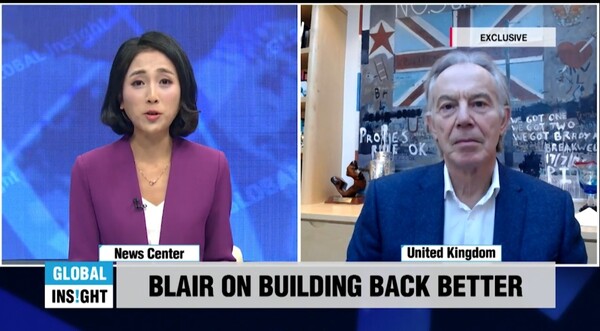
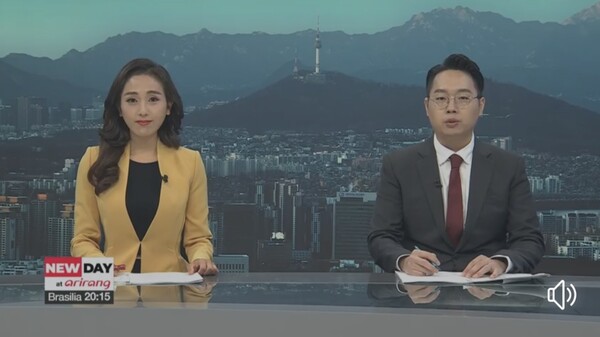
Q. Are there any specific topics that you are currently interested in?
A. My passion has always been in foreign policy and national defense. As an international studies graduate, I love to read about different angles of prospects and analyses on each geopolitical development or event. Being a defense correspondent was a very exciting time of my life: getting insights on how South Korea should advance its defense posture and, of course, getting to observe military training first-hand! In terms of novelty, my time as a business and tech correspondent was always full of excitement – checking out the latest digital technologies and robots.
Q. What was the most impressive interviewee, interview spot, or episode?
A. I interviewed former NBA star Dennis Rodman in 2018 shortly after U.S. President Donald Trump met North Korean dictator Kim Jong-un in an unprecedented summit. It was fascinating to hear about how he had feasted on burgers in North Korea and spent time talking with Kim Jong-un. At the same time, it was striking how one could be so notoriously ruthless and commit such heinous violations of human rights violence. I wondered why Kim continues to rule the way he does.
Q. What is the role and significance of global broadcast in international society? What is the goal of Arirang TV?
A. Arirang’s worldwide goal is to provide fair and accurate coverage of Korean and international issues to serve global citizens. We are driven by South Korea’s liberal democratic values of promoting openness, freedom, and transparency to contribute to public knowledge. We strive to exert positive leverage as Korean international broadcasting to enhance public knowledge worldwide.
Q. Please tell us about your future goals as a journalist.
A. I hope to become a better journalist, especially in foreign policy. I want to be more knowledgeable, seasoned, and more skilled at writing; to contribute to consolidating the diplomatic, and defense power of South Korea. My vision is to help enhance South Korea’s unique position in the world, as a liberal democracy with a phenomenal story of liberation, division, and modernization: so that we can inspire and empower other nations to develop industries, human resources, and creative public policies that helped us reach where we are today.
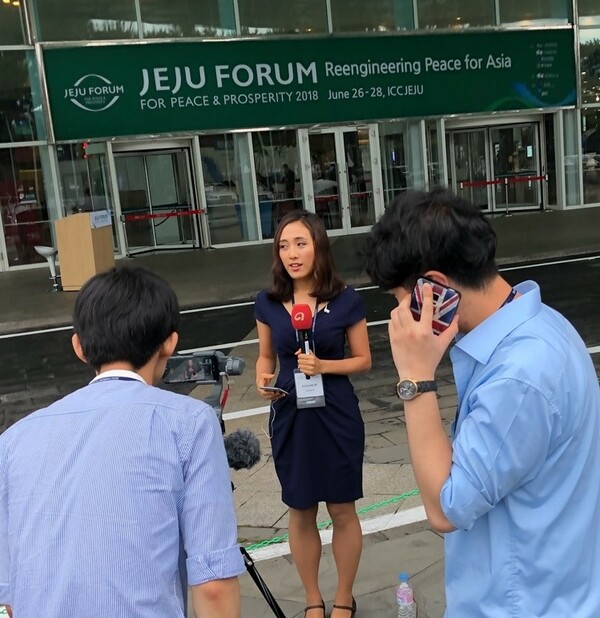
#As a person Oh Soo-young
Q. Do you have any tips on balancing your daily life when faced with such a vast amount of work?
A. I am not sure it is possible to have a work-life balance as a reporter because work tends to characterize our lives heavily. But when I feel overwhelmed, I lose myself in a good book. My favorite genre is spy, fiction novels that are well-written with ironic humor. It is the best way for me to detach from reality, refresh, re-engage, and feel inspired. Good coffee also helps a lot. I even acquired a barista qualification but the lower tier; the higher one was too much pressure for me!
Q. Were there any difficulties in complying with the unpredictable and high-pressure lifestyle?
A. Life as a journalist did affect my daily life pattern and relationships. But every time a difficulty arose, my friends and family showed me endless support and tried to understand my situation even when I had to cancel the appointments suddenly. Unpredictability has always been inevitable, which initially made me exhausted. However, spending most of my years interviewing people and developing feature stories helped me get used to my life and accept the difficulties. Above all, the fact that I grew to enjoy the challenge enabled me to move forward.
Q. What would you recommend students experience during their university school life?
A. Serving other people through volunteering work is a must.
Interacting and cooperating with people who may be vastly different from you make one realize that the world does not revolve around oneself. The reason you live, work, and aim to do well is to make the world better for the whole of society, more than your individual privilege or pleasure. By serving others, you understand that your place in the world is minuscule, but it can only be meaningful if you look beyond yourself and find purpose.
Q. Thank you for the interview. Do you have any last words for your HYU juniors that dream to be a reporter?
A. Be kind and truthful, and never compromise. Here is my favorite saying: Act justly, love with mercy, and walk humbly with your God. You do not earn much as a reporter. Humanity and integrity are all you have.

